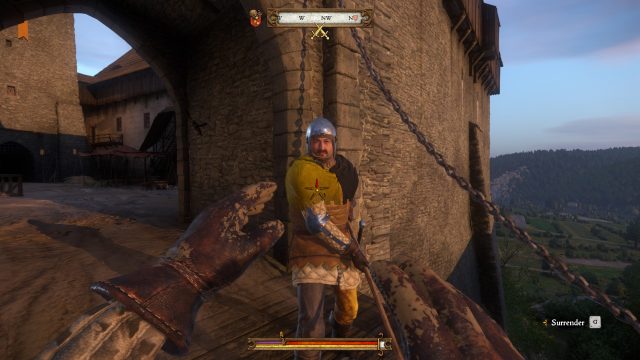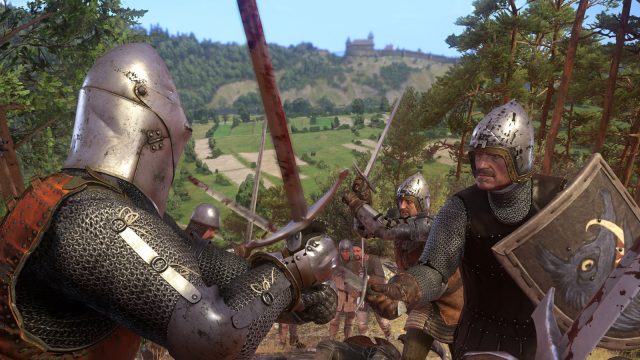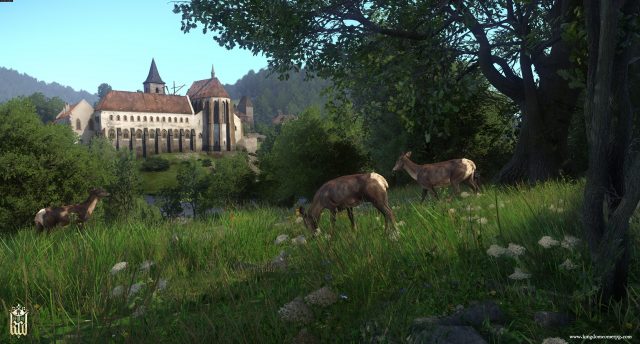Kingdom Come: Deliverance Review
My Kingdom for a (War)Horse
RPGs: home to slavering dragons blotting out the sun, mystical elves wielding ancient enchanted blades, sci-fi blaster battles on distant alien worlds, and androgynous youths clad in fierce fashions sporting an unpractical amount of zippers and buckles. These are among the first images players may associate with their favorite gaming genre. Which is exactly what makes Warhorse Studios’ realistic-to-the-max effort Kingdom Come: Deliverance such a noteworthy occurrence. Sure, it’s not the first game to eschew fantasy and science fiction trappings or feature a historically-accurate setting, but not many have yet done so to such a satisfying end result, not to mention going the open-world route and still succeeding, for the most part, brilliantly.
Any review of Kingdom Come: Deliverance should probably begin with a warning of some sort, that this game is not for those that are easily frustrated. Life is hard, and this game, in its quest to remain as lifelike as possible, does not shy away from absolutely crushing the player, particularly during its first half. It’s not so much that things get easier later on, but being given time to come to grips with the game’s various systems and level up skills at least enables players to meet new challenges on more even footing. Practice is the operative word here, and while it won’t make things perfect in KC:D — there are still plenty of challenges during the game’s latter stages — players will at least be able to hold their own.
This isn’t a case of a game being challenging for the sake of it; everything is in service of realism. Players take on the role of young Henry of Skalitz, a common blacksmith’s son living a simple life at the turn of the fifteenth century in the kingdom of Bohemia, the western part of the current-day Czech Republic. Henry’s daily life consists of assisting at his father’s forge, flirting with the local tavern wench, and causing trouble with his mates. As befits his station in this realistic medieval world, Henry has no formal weapons training, no money to his name, and only a passing knowledge of horsemanship. If this sounds like the early hours spent in the game severely hamstring players as to what they can do, that is because they absolutely do. Kingdom Come puts most of its emphasis on the role-playing parts of being an RPG, often treating the gaming as a distant third. This does wonderful things for immersion, but some players will find the price of admission too high to accept. Amazingly, a Hardcore game mode has been added since release, upping the ante on realistic play by, amongst other things, hiding the combat reticule, eliminating fast travel, and forcing players to navigate via landmarks and position of the sun by taking away the in-game map.
To make sure players get the most accurate simulation of medieval life in Kingdom Come, Warhorse brought in a slew of academics to act as historical experts and advisors on the project. As Henry travels the land and overhears bits of info, an in-game codex fills with detailed accounts of the Bohemian life, from historical figures, battles, and locations, to rules governing everyday existence, religion, even how toilets and plumbing worked back then, and everything in between. Should Henry go a while without washing, the citizenry, particularly the sensitive noses of the nobility, will respond to him less enthusiastically. Food will spoil if not eaten quickly, guards will imprison Henry if he’s seen in town at night without a torch to light his way, and even the fast travel system will only go so far as to move Henry at a faster speed than normal to the desired location while time moves on and his energy and hunger levels continue to decline. The list goes on, and it’s honestly a bit overwhelming to keep up with everything when first starting the game, but all these details are implemented in such a way as to become second nature before too long.
Using swords, axes, maces, spears, and other medieval weaponry, the basic idea of combat revolves around going beyond mere hit-or-miss strikes. Opponents — as well as Henry himself — have five different hit zones that must be individually targeted. Strikes to the head, arms, and legs require different command inputs, and take into account how the opponent is armored in each region, as well as whether the blow is being properly blocked or not. A stamina gauge depletes with each strike made and received, often acting as an additional buffer before damage begins chipping away at the health bar. It’s a complicated system that requires quite a bit of practice to become comfortable with, and when combined with Henry’s lack of combat skill and armor it makes early battles against trained and outfitted soldiers seem incredibly unfair. Once Henry attracts an opponent’s attention, the game will also not permit him to heal himself, so opening up the pause menu and eating a quick meal mid-battle to heal is not an option.
A number of other systems that come into play in KC:D can seem equally difficult to come to terms with. At the start of the game, Henry is unable to perform most actions, simply because he has never been taught how to do them. Pickpocketing, archery, and even reading are things a simple blacksmith’s son would have never learned in medieval Bohemia, so Henry must find someone to teach him these things before he can even begin to struggle through each skill’s early ranks. Brewing healing potions can be a useful skill, but one must first have all necessary ingredients, the proper recipe, and finally be able to even read the recipe in the first place before even attempting the herbalism mini game, which literally has players follow each step in the recipe to boil, grind, simmer, and distill potions. Easily the most difficult and most useful skill to learn is lockpicking, which consists of an accuracy mini game that, early on, can be frustrating to the point of giving up, and is an example of something that was made all the more challenging by being ported from a mouse-and-keyboard setup to a gamepad’s thumbsticks.
As challenging as it can be at first to adapt to the different gameplay systems, it’s the realistic role-playing that players will remember long after the game’s ending credits roll. One of the key aspects of making players love their time as Henry is Kingdom Come‘s outstanding narrative. To be honest, the prospect of spending seventy-odd hours in a historically accurate medieval Eastern European setting didn’t wholly appeal to me right off the bat — it just isn’t the type of setting I prefer in my games. Which makes it all the more noteworthy that, even by the end of the game’s prologue which sets up the main story’s forty-hour revenge tale, I felt myself fully invested.
Over the course of the game, Henry learns about, and even plays a small part in, several historical events. The entirety of the game is set against the backdrop of the war for the crown of Bohemia, as a sudden void in the monarchy throws the region’s noble houses, who all play prominent roles and are surprisingly well fleshed out, into turmoil. The writing is spot-on; there’s something very human in the way Henry interacts with the game’s characters, whether he’s forming a genuine bond of friendship with them or deferring to them in heartfelt shows of respect. Several optional missions in the game exist purely as character development, leading to some of the most honest and human relationships between video game characters I’ve seen in a long time. It’s a real testament to the designers at Warhorse, particularly lead writer and game director Daniel Vávra, proving without a doubt that realism can be every bit as entertaining as the most fantastical fiction.
Apart from these character missions, KC:D is filled with plenty of other side quests to tackle apart from the main story. However, as with many open-world games, they can cause the main narrative to be too frequently shoved into the background. With this much to do, one often feels compelled to switch gears for a while and complete some side quests, and it seems necessary to do so given the main story’s requirement for properly leveled-up skills. As enthralling as the main story is, a constant flow of interruptions doesn’t do it any favors. True, a good chunk of the side quests are much more substantial than what other games may have on offer, often going far beyond the standard fetch quest trope, and some even featuring their own interesting narrative. But accomplishing all there is to do can easily bloat the game to about double its length, and interrupt the pacing that would otherwise put the finishing touch on an expertly-told tale.
The cast of characters, and really just the overall immersion in the world, is helped tremendously by the game’s voicework and soundtrack. Across the board, the main character line-up sounds great. The actors are absolutely believable, from the calm and stately Sir Radzig to the loud and jovial Sir Hanush, to even Henry himself. Venerable Shakespearean actor Brian Blessed even puts in an appearance towards the end of the main campaign. No less impressive is the music composed for the game, consisting of period-appropriate pieces performed on suitable instruments. One minor complaint is that much of the music becomes repetitive, especially for those taking the time to complete as much of the game as possible. The screamo metal song played over the ending credits was also an odd departure, and stands out as the only anachronistic piece of music in the game.
The extent to which the designers took pains to make the game as realistic of a representation of medieval Bohemia as possible is readily apparent and Warhorse Studios’ love for their home country shines through in spades. Real-world locations and structures have been faithfully recreated in the game, appropriately de-aged by about 600 years, of course. Despite there being no floating cities, boiling lava pools, or magic vortices to marvel at, the green fields and lush countryside of Kingdom Come truly have a serene beauty all their own. It may sound odd, but the game makes even mundane things such as a puddle of rainwater in a sloshy wagon-wheel-chewed path or a hazy sunrise on an overcast morning look stunningly gorgeous. Less impressive are the character models of the citizenry. Not only does everyone seem to exist as identical twins, triplets, and even quadruplets, but the exaggerated body movements and expressions used to animate characters during dialog sequences do little other than provide some unintended comedy.
With as much as Kingdom Come: Deliverance has going for it, it’s impossible to play the game without coming to terms with its sometimes rather poor performance, particularly on consoles. As already mentioned, the change from mouse-and-keyboard to gamepad comes with its own unique detractors, but even playing on PlayStation 4 — reportedly the better-performing of the two console versions — optimization is still far from perfect. Lengthy loading screens are a constant companion throughout Henry’s journey: arriving at a fast-travel location, entering and exiting many cinematics, and even entering the game’s main menu screen take time. Graphics continue to load in while playing: it’s not uncommon to see villagers stroll along as one article of clothing after another magically appear on their bodies; fences, walls, and furniture can be completely invisible while bumping into them; textures, including during conversation close-ups, can appear and disappear without warning. Luckily, I did not encounter any game-breaking bugs or glitches; some loss of immersion is about the only damage done by the flaws still present in the game at this time.
It’s easy to point out specific areas of accomplishment for which KC:D absolutely deserves to be praised. Managing to tell a highly engaging story that stays absolutely rooted in a medieval reality is certainly a good place to start. Outstanding characterizations, lush environments, and a captivating soundtrack are equally as noteworthy. But it’s really the harder-to-quantify total sense of immersion into everyday fifteenth-century life that will put the game over the top for many, the caveat being that the focus on realism can lead to frustrating moments in combat and some skill-development. Anybody interested in a well-told story and not put off by having to work a bit to earn success really owes it to themselves to give Kingdom Come: Deliverance a shot.


Unparalleled focus on realism
Writing and characterizations with genuine emotion
An engaging story that feels like an actual chapter in a history text
Outstanding presentation with very few flaws
Combat system leans too far from intuitive
Some skill sections can easily get frustrating, particularly with console controllers
Overall optimization issues bring the PS4 within an inch of giving up its ghost









I’m glad you reviewed this. Seems to be a somewhat divisive game. Even if the mechanics don’t work for everyone’s taste, the developers achieved what they set out to do.
I read a lot about this game before deciding to pass on it. It seems to have a long list of issues that could each individually make the game unplayable if any one frustrates you enough. The concept is great, though.